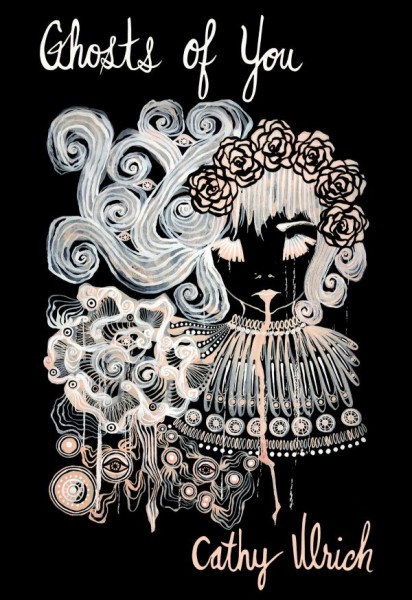
Reviewed by Emily Webber
Cathy Ulrich’s Ghosts of You (Okay Donkey Press, 2019) is a full-length collection of her Murdered Ladies series. In each of these forty flash fiction pieces, Ulrich seeks out women lost to violent acts and presents a different murdered woman one after another, calling to mind familiar stories from the news. Each begins with the same opening line, addressing the murdered woman, not the reader, which sets these stories in motion, into seemingly well-known narratives, and flipping the script. Ghosts of You pulls the reader in from the first story and keeps that hold over the entire collection, all with haunting and heartbreaking language.
Your mother will see sparrows in the yard; the yard will be blanketed by sparrows, and she’ll tap her finger against the window, breath fogging the glass, think collective nouns, think knot, quarrel, flutter. She’ll hear your name in the whisper of their chirping mouths, feel the beginning of something leaving the inside of her, a hollowing in her chest, and the phone will ring.
Instead of blending together, every one of Ulrich’s stories shines with specific details and lyrical writing. Captured in Ghosts of You is the real grief of mothers, fathers, and of loved ones, but also how people twist tragedy for their own benefit and how the murdered person is erased. There’s a feeling that these women are anyone and everyone. Revealed through each murdered woman are the intricacies of relationships and the true stories that have been obscured by news headlines or dismissed. In a culture that is becoming increasingly accustomed to violence, Ghosts of You asks the reader to rethink and look again. “Being the Murdered Girl” begins the collection and gets to the heart of how these stories explore the tendency to sensationalize violence.
You’ll be a saint. You’ll be a whore. You’ll be the murdered girl, the first any of them have known, except the detective with a dark past who will investigate your murder. He’s known tons of murdered girls. He’s had his fill of them. You’re nothing special to him.
In “Being the Murdered Homecoming Queen,” the murdered girl is transformed into a haunt, a story with no name, a warning for other girls:
The girls will remember you, the girls always will. Pass you down from one class to another, lose your name along the way. Murdered homecoming queen, you don’t need a name, the thing you have become is more real a name than the one you ever had before.
Through brilliant use of language and detail in “Being the Murdered Moll,” Ulrich also shows how we romanticize and make light of violence:
It will be raining when you die, stolen car dragging in the back-road mud. They’ll say there was a pepper of gunfire; they’ll say you were wearing your best dress again, wearing it still, were smoothing the folds over your lap, looking out the window at the falling rain.
I was just playing around, the boyfriend in “Being the Murdered Girlfriend” after the gun goes off and kills his girlfriend. The boyfriend’s family speaks about how they always knew the girlfriend was trouble. The boy’s parents and lawyer repeat in his defense that the gun going off was just an accident, and he receives the most minimal punishment and goes home. This story, especially the chilling car ride scene below, makes visible just how much society prizes dominance and excuses violence for those deemed “good” boys.
You looked forward and there was something there, something small, cat, maybe, or rabbit, prairie dog. And you said oh, felt the truck go over the top of it, didn’t cry, weren’t the kind of girl who would cry over a small thing like that, over a small thing that had been alive and wasn’t alive anymore, but you said oh again, looked over at your boyfriend and saw, in the moonlight, the brilliance of his smile.
The collection ends with one of Ulrich’s most powerful stories, “Being the Murdered Indian.” This story is so steeped in emotion and heavy with sadness. It speaks to the long-lasting impact of losing a person to a violent act and the hopelessness of trying to obtain justice.
You will be the quiet of the highway before a semi rumbles through, you will be the pavement cracked with dandelion sprout. You will be the window at your sister’s place that never quite closes, the whistle-hiss of wind at night.
Pieces of these murdered women are everywhere, and reading the stories collected together reminds readers again of the constant cycle of violence perpetrated against women. So many real-life stories simply disappear after the initial media frenzy. It is as if the loss of these women is on two levels: the loss of the actual person and then the loss of their unfiltered, untarnished story. There’s a timelessness to Ghosts of You, and even after many readings, there’s still fresh meaning and details. Ulrich is giving these women their due, breaking open the wounds, bringing them to the foreground and transforming their stories.
Ghosts of You by Cathy Ulrich is available from Okay Donkey Press October 2019
__________________________
 Emily Webber was born and raised in South Florida where she lives with her husband and son. She has published fiction, essays, and reviews in the Ploughshares Blog, The Writer magazine, Five Points, Maudlin House, Split Lip Magazine, and elsewhere. She’s the author of a chapbook of flash fiction, Macerated, from Paper Nautilus Press. Read more at www.emilyannwebber.com.
Emily Webber was born and raised in South Florida where she lives with her husband and son. She has published fiction, essays, and reviews in the Ploughshares Blog, The Writer magazine, Five Points, Maudlin House, Split Lip Magazine, and elsewhere. She’s the author of a chapbook of flash fiction, Macerated, from Paper Nautilus Press. Read more at www.emilyannwebber.com.

 Try SmokeLong Fitness for two months!
Try SmokeLong Fitness for two months!